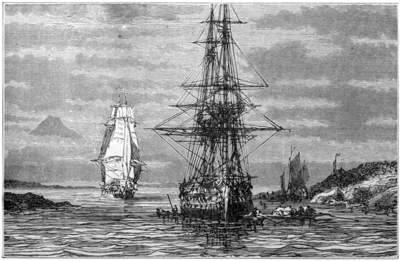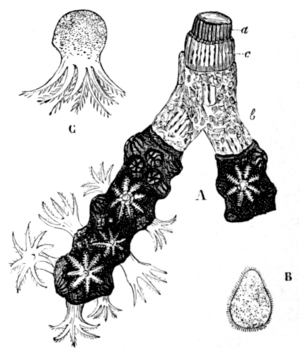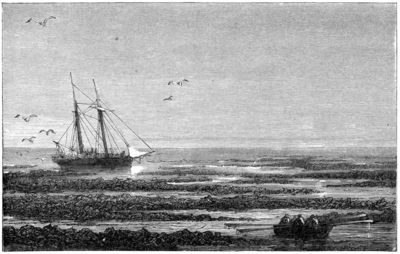The Ocean and Its Wonders/Chapter 4

CHAPTER IV.
![]() F all the varied motions of the sea, the most important, perhaps, as well as the most wonderful, is the Gulf Stream. This mighty current has been likened by Maury to a “river in the ocean. In the severest droughts it never fails, and in the mightiest floods it never overflows. Its banks and its bottom are of cold water, while its current is of warm. It takes its rise in the Gulf of Mexico (hence its name), and empties into the arctic seas. Its current is more rapid than the Mississippi or the Amazon, and its volume more than a thousand times greater.”
F all the varied motions of the sea, the most important, perhaps, as well as the most wonderful, is the Gulf Stream. This mighty current has been likened by Maury to a “river in the ocean. In the severest droughts it never fails, and in the mightiest floods it never overflows. Its banks and its bottom are of cold water, while its current is of warm. It takes its rise in the Gulf of Mexico (hence its name), and empties into the arctic seas. Its current is more rapid than the Mississippi or the Amazon, and its volume more than a thousand times greater.”

GULF OF MEXICO—STARTING POINT OF THE GULF STREAM.
The waters of the Gulf Stream are salter than those of the sea; which fact accounts for its deeper blue colour, it being well known that salt has the effect of intensifying the blue of deep water.
The cause of the Gulf Stream has long been a subject of conjecture and dispute among philosophers. Some have maintained that the Mississippi river caused it; but this theory is upset by the fact that the stream is salt—salter even than the sea—while the river is fresh. Besides, the volume of water emptied into the Gulf of Mexico by that river is not equal to the three thousandth part of that which issues from it in the form of the Gulf Stream.
Scientific men are still disagreed on this point. They all, indeed, seem to hold the opinion that difference of temperature has to do with the origination of the stream; but while some, such as Captain Maury, hold that this is the chief cause, others, such as Professor Thompson, believe the trade-winds to be the most important agent in the matter. We venture to incline to the opinion that not only the Gulf Stream, but all the constant currents of the sea are due chiefly to difference of temperature and saltness. These conditions alter the specific gravity of the waters of the ocean in some places more than in others; hence the equilibrium is destroyed, and currents commence to flow as a natural result, seeking to restore that equilibrium. But as the disturbing agents are always at work, so the currents are of necessity constant. Other currents there are in the sea, but they are the result of winds and various local causes; they are therefore temporary and partial, while the great currents of the ocean are permanent, and are, comparatively, little affected by the winds. Every one knows that when a pot is put on the fire to boil, the water contained in it, as soon as it begins to get heated, commences to circulate. The heated water rises to the top, the cold descends. When heated more than that which has ascended, it in turn rises to the surface; and so there is a regular current established in the pot, which continues to flow as long as the heating process goes on. This same principle of temperature, then, is one of the causes of the Gulf Stream. The torrid zone is the furnace where the waters of the ocean are heated. But in this process of heating, evaporation goes on to a large extent; hence the waters become salter than those elsewhere. Here is another agent called into action. The hot salt waters of the torrid zone at once rush off to distribute their superabundant caloric and salt to the seas of the frigid zones; where the ice around the poles has kept the waters cold, and the absence of great heat, and, to a large extent, of evaporation, has kept them comparatively fresh. In fact, the waters of the sea require to be stirred, because numerous agents are at work day and night, from pole to pole, altering their specific gravity and deranging, so to speak, the mixture. This stirring is secured by the unalterable laws which the Creator has fixed for the carrying on of the processes of nature. The currents of the sea may be said to be the result of this process of stirring its waters.
It is curious and interesting to note the apparently insignificant instruments which God has seen fit to use in the carrying out of his plans. The smallest coral insect that builds its little cell in the southern seas exercises an influence in the production of the Gulf Stream. It has been said, with some degree of truth, that one such insect is capable of setting in motion the entire ocean! The coral insect has, in common with many other marine creatures, been gifted with the power of extracting from sea water the lime which it contains, in order to build its cell. The lime thus extracted leaves a minute particle of water necessarily destitute of that substance. Before that particle can be restored to its original condition of equality, every other particle of water in the ocean must part with a share of its superabundant lime! The thing must be done. That bereaved particle cannot rest without its lime. It forthwith commences to travel for the purpose of laying its brother-particles under contribution; and it travels far and wide—round and round the world. Myriads upon myriads of coral insects are perpetually engaged in thus robbing the sea water of its lime; shells are formed in a similar manner: so that

BRANCH OF RED CORAL WITH THE POLYPS IN.
A, branch of coral; a, the stony stem; b, vessels spreading; c, vessels going in straight lines; B, a germ set free; C, a full-grown polyp.
our particle soon finds itself in company with innumerable other particles of water in a like destitute condition. It rises to the surface. Here the sun, as if to compensate it for the loss of its lime, bestows upon it an unusual amount of heat; and the surrounding particles, not to be out-done, make it almost unlimited presents of salt. Full to overflow with the gifts of its new companions, it hastens to bestow of its superabundance on less favoured particles; joins the great army of the ocean’s currents; enters, perchance, the Gulf of Mexico, where it is turned back, and hastens along with the Gulf Stream, with all its natural warmth of character, to ameliorate the climate of Great Britain and the western shores of Europe. Having accomplished this benevolent work, it passes on, with some of its heat and vigour still remaining, to the arctic seas—where it is finally robbed of all its heat and nearly all its salt, and frozen into an icicle—there for many a long day to exert a chilling influence on the waters and the atmosphere around it. Being melted at last by the hot sun of the short arctic summer, it hurries back with the cold currents of the north to the genial regions of the equator, in search of its lost caloric and salt, taking in a full cargo of lime, &c., as it passes the mouths of rivers. Arrived at its old starting-point, our wanderer receives once more heat and salt to the full, parts with its lime, and at once hastens off on a new voyage of usefulness—to give out of its superabundance in exchange for the superabundance of others: thus quietly teaching man the lesson that the true principles of commerce were carried out in the depths of the sea ages before he discovered them and carried them into practice on its surface.
Perchance another fate awaits this adventurous particle of water. Mayhap, before it reaches the cold regions of the north, it is evaporated into the clouds, and descends upon the earth in fresh and rerefreshing rain or dew. Having fertilized the fields, it flows back to its parent ocean, laden with a superabundant cargo of earthy substances, which it soon parts with in exchange for salt. And thus on it goes, round and round the world; down in the ocean's depths, up in the cloudy sky, deep in the springs of earth; ever moving, ever active, never lost, and always fufilling the end for which it was created.
All ocean currents are composed of water in one or other of the conditions just described;—the hot and salt waters of the equator, flowing north to be cooled and freshened; the cold and fresh waters of the north, flowing south to be heated and salted. The Gulf Stream is simply the stream of equatorial hot water that flows towards the pole through the Atlantic. Its fountain-head is the region of the equator, not the Gulf of Mexico; but it is carried, by the conformation of the land, into that gulf and deflected by it, and from it out into the ocean in the direction of Europe. This stream in the Atlantic is well defined, owing to the comparative narrowness of that sea.
The Gulf Stream, then, is like a river of oil in the ocean,—it preserves its distinctive character for more than three thousand miles. It flows towards the polar regions, and the waters of those regions flow in counter-currents towards the equator, because of the fixed law that water must seek its equilibrium as well as its level, thus keeping up a continuous circulation of the hot waters towards the north and the cold towards the south. There are similar currents in the Pacific, but they are neither so large nor so regular as those of the Atlantic, owing to the wide formation of the basin of the former sea.
The effect of the Gulf Stream on climate is very great. The dreary fur-trading establishment of York Factory, on the shores of Hudson's Bay, is surrounded by a climate of the most rigorous character—the thermometer seldom rising up so high as zero during many months, and often ranging down so low as 50° below zero, sometimes even lower, while the winter is seven or eight months long: the lakes and rivers are covered with ice upwards of six feet thick, and the salt sea itself is frozen. Yet this region lies in the same latitude with Scotland, York Factory being on the parallel of 57° north, which passes close to Aberdeen! The difference in temperature between the two places is owing very much, if not entirely, to the influence of the Gulf Stream.
Starting from its caldron in the Gulf of Mexico, it carries a freight of caloric towards the North Atlantic. Owing partly to the diurnal motion of the Earth on its axis, its flow trends towards the east; hence its warm waters embrace our favoured coasts, and ameliorate our climate, while the eastern sea-bord of North America is left, in winter, to the rigour of unmitigated frost.
But besides the powerful influence of this current on climate, it exerts a very considerable influence on navigation. In former times, when men regarded the ocean as a great watery waste—utterly ignorant of the exquisite order and harmonious action of all the varied substances and conditions which prevail in the sea, just as much as on the land—they committed themselves to the deep as to a blind chance, and took the storms and calms they encountered as their inevitable fate, which they had no means of evading. Ascertaining, as well as they could from the imperfect charts of those days, the position of their desired haven, they steered straight for it through fair weather and foul, regarding interruptions and delays as mere unavoidable matters of course.
But when men began to study the causes and effects of the operation of those elements in the midst of which they dwelt, they soon perceived that order reigned where before they had imagined that confusion revelled; and that, by adapting their operations to the ascertained laws of Providence, they could, even upon the seemingly unstable sea, avoid dangers and delays of many kinds, and oftentimes place themselves in highly favourable circumstances. Navigators no longer dash recklessly into the Gulf Stream, and try to stem its tide, as they did of yore; but, as circumstances require, they either take advantage of the counter-currents which skirt along it, or avail themselves of the warm climate which it creates even in the midst of winter.

SARGASSO SEA.

SARGASSO WEED.
appearance of solid land; and ships find extreme difficulty in getting through this region, which is rendered still further unnavigable by the prevalence of long-continued calms. This Sargasso Sea is of considerable extent, and lies off the west coast of Africa, a little to the north of the Cape Verd Islands.
In former years, ships used to get entangled in this weedy region for weeks together, unable to proceed on their voyage. The great Columbus fell in with it on his voyage to America, and his followers, thinking they had reached the end of the world, were filled with consternation. This Sargasso Sea lies in the same spot at the present day, but men now know its extent and position. Instead of steering straight for port, they proceed a considerable distance out of their way, and, by avoiding this calm region, accomplish their voyages with much greater speed.
The ocean currents have been, by repeated and long-continued investigation, ascertained and mapped out; so also have the currents of the atmosphere: so that, now-a-days, by taking advantage of some of these currents and avoiding others, voyages are performed, not only in much shorter time, but with much greater precision and certainty. As it was with ocean currents long ago, so was it with atmospheric. Navigators merely put to sea, steered as near as possible on their direct course, and took advantage of such winds as chanced to blow. Now they know whither to steer in order to meet with such winds and currents as will convey them in the shortest space of time to the end of their voyage. The knowledge necessary to this has not been gained by the gigantic effort of one mind, nor by the accidental collocation of the results of the investigations of many ordinary minds. But a few master-minds have succeeded in gathering within their own grasp the myriad facts collected by thousands of naval men, of all countries, in their various voyages; and, by a careful comparison and philosophical investigation of these facts, they have ascertained and systematized truths which were before unknown, and have constructed wind and current charts, by the use of which voyages are wonderfully shortened, commercial enterprises greatly facilitated, and the general good and comfort of nations materially advanced.
The truth of this has of late been proved by incontestable facts. For instance, one year particular note was taken of the arrival of all the vessels at the port of San Francisco, in California; and it was found that of 124 vessels from the Atlantic coast of the United States, 70 were possessed of Maury's wind and current charts. The average passage of these 70 vessels, on that long voyage round Cape Horn, was 135 days; while the average of those that sailed without the charts (that is, trusted to their own unaided wisdom and experience) was 146 days. Between England and Australia the average length of the voyage out used, very recently, to be 124 days. With the aid of these charts it has now been reduced to 97 days on the average.
The saving to commerce thus achieved is much greater than one would suppose. At the risk of becoming tedious to uninquiring readers, we will make a brief extract from Hunt's "Merchants' Magazine" of 1854, as given in a foot-note in Maury's "Physical Geography of the Sea:"—
"Now, let us make a calculation of the annual saving to the commerce of the United States effected by these charts and sailing directions. According to Mr. Maury, the average freight from the United States to Rio Janeiro is 17.7 cents per ton per day; to Australia, 20 cts.; to California, also about 20 cts. The mean of this is a little over 19 cts. per ton per day; but, to be within the mark, we will take it at 15, and include all the ports of South America, China, and the East Indies.
"The sailing directions have shortened the passage to California 30 days; to Australia, 20; to Rio Janeiro, 10. The mean of this is 20; but we will take it at 15, and also include the above-named ports of South America, China, and the East Indies.
"We estimate the tonnage of the United States engaged in trade with these places at 1,000,000 tons per annum.
"With these data, we see that there has been effected a saving for each one of these tons, of 15 cents per day for a period of 15 days, which will give an aggregate of $2,250,000 (£468,750) saved per annum. This is on the outward voyage alone, and the tonnage trading with all other parts of the world is also left out of the calculation. Take these into consideration, and also the fact that there is a vast amount of foreign tonnage trading between these places and the United States, and it will be seen that the annual sum saved will swell to an enormous amount."
Before the existence of the Gulf Stream was ascertained, vessels were frequently drifted far out of their course in cloudy or foggy weather, without the fact being known, until the clearing away of the mists enabled the navigators to ascertain their position by solar observation. Now, not only the existence, but the exact limits and action of this stream are known and mapped; so that the current, which was formerly a hindrance to navigation, is now made to be a help to it. The line of demarcation between the warm waters of the Gulf Stream and the cold waters of the sea is so sharp and distinct, that by the use of the thermometer the precise minute of a ship's leaving or entering it can be ascertained. And by the simple application of the thermometer to the Gulf Stream the average passage from England to America has been reduced from upwards of eight weeks to little more than four!
But this wonderful current is useful to navigators in more ways than one. Its waters, being warm, carry a mild climate along with them through the ocean even in the depth of winter, and thus afford a region of shelter to vessels when attempting to make the Atlantic coast of North America, which at that season is swept by furious storms and chilled by bitter frosts. The Atlantic coasts of the United States are considered to be the most stormy in the world during winter, and the difficulty of making them used to be much greater in former days than now. The number of wrecks that take place off the shores of New England in mid-winter is frightful. All down that coast flows one of the great cold currents from the north. The combined influence of the cold atmosphere above it, and the warm atmosphere over the Gulf Stream, far out at sea, produces terrific gales. The month's average of wrecks off that coast has been as high as three a day. In making the coast, vessels are met frequently by snow-storms, which clothe the rigging with ice, rendering it unmanageable, and chill the seaman's frame, so that he cannot manage his ship or face the howling blast. Formerly, when unable to make the coast, owing to the fury of these bitter westerly gales, he knew of no place of refuge short of the West Indies, whither he was often compelled to run, and there await the coming of genial spring ere he again attempted to complete his voyage. Now, however, the region of the Gulf Stream is sought as a refuge. When the stiffened ropes refuse to work, and the ship can no longer make head against the storm, she is put about and steered for the Gulf Stream. In a few hours she reaches its edge, and almost in a moment afterwards she passes from the midst of winter into a sea of summer heat! "Now," as Maury beautifully expresses it, "the ice disappears from her apparel; the sailor bathes his limbs in tepid waters. Feeling himself invigorated and refreshed with the genial warmth about him, he realizes out there at sea the fable of Antæus and his mother Earth. He rises up and attempts to make his port again, and is again, perhaps, as rudely met and beat back from the northwest; but each time that he is driven off from the contest, he comes forth from this stream, like the ancient son of Neptune, stronger and stronger, until, after many days, his freshened strength prevails, and he at last triumphs, and enters his haven in safety—though in this contest he sometimes falls to rise no more, for it is terrible."
The power of ocean currents in drifting vessels out of their course, and in sweeping away great bodies of ice, is very great; although, from the fact that there is no land to enable the eye to mark the flow, such drifts are not perceptible. One of the most celebrated drifts of modern times, and the most astonishing on account of its extent, was that of the Fox in Baffin's Bay in the year 1857, a somewhat detailed account of which will be found in a succeeding chapter.
The Gulf Stream is the cause of many of the most furious storms. The fiercest gales sweep along with it, and it is supposed that the spring and summer fogs of Newfoundland are caused by the immense volumes of warm water poured by it into the cold seas of that region. We are told that Sir Philip Brooke found the temperature of the sea on each side of this stream to be at the freezing-point, while that of its waters was 80°. From this it may be easily seen how great are the disturbing influences around and above it; for, as the warm and moist atmosphere over it ascends in virtue of its lightness, the cold air outside rushes in violently to supply its place, thus creating storms.
The warm waters of this stream do not, it is believed, anywhere extend to the bottom of the sea. It has been ascertained, by means of the deep-sea thermometer, that they rest upon, or rather flow over, the cold waters which are hastening from the north in search of those elements which, in their wanderings, they have lost. As cold water is one of the best non-conductors of heat, the Gulf Stream is thus prevented from losing its caloric on its way across the Atlantic to ameliorate the climates of the western coasts of Europe, and moderate the bitterness of the northern seas. Were it otherwise, and this great stream flowed over the crust of the Earth, so much of its heat would be extracted, that the climates of France and our own islands would probably resemble that of Canada. Our fields would be covered, for two, three, or four months, with deep snow; our rivers would be frozen nearly to the bottom; our land traffic would perhaps be carried on by means of sledges and carioles; our houses would require to be fitted with double window-frames and heated with iron stoves; and our garments would have to be made of the thickest woollens and the warmest furs!
The presence and the unchanging regularity of these great hot and cold currents in the ocean is indicated very clearly by the living inhabitants of the deep. These, as certainly as the creatures of the land, are under the influence of climate; so much so, that many of them never quit their native region in the sea. All the beautiful and delicate marine creatures and productions which dwell in the warm waters of the south are utterly absent from those shores which are laved by the cold currents that descend from the north; while, owing to the influence of the Gulf Stream, we find many of those lovely and singular creatures upon our comparatively northern shores. Of late years, as every one knows, we have all over the land been gathering these marine gems, and studying their peculiar habits with deep interest in that miniature ocean the aquarium. In the same parallel on the other side of the Atlantic none of these little lovers of heat are to be found.
On the other hand, the whale, delighting as it does to lave its huge warm-blooded body in iced water, is never found to enter the Gulf Stream. Thus these fish, to some extent, define its position. Other fish there are which seem to resemble man in their ability to change their climate at will; but, like him also, they are apt in so doing to lose their health, or, at least, to get somewhat out of condition. Some kinds of fish, when caught in the waters off Virginia and the Carolinas, are excellent for the table; but the same species, when taken off the warm coral banks of the Bahamas, are scarcely worth eating. In fact, we see no reason for doubting that when these fish find their health giving way in the warm regions of the south, they seek to reïnvigorate themselves by change of water; and, quitting for a time the beauteous coral groves, spend a few of the summer months of each year in gambolling in the cool regions of the north, or, what is much the same thing, in those cool currents that flow from the north in clearly defined channels.

A MEDUSA.
Besides its other useful and manifold purposes, the Gulf Stream would seem to be one of the great purveyors of food to the whales. Sea-nettles, or medusæ, are well known to constitute the principal food of that species of whale which is termed the right whale. Navigators have frequently observed large quantities of these medusæ floating along with the Gulf Stream; and one sea captain in particular fell in with an extraordinarily large quantity of them, of a very peculiar species, off the coast of Florida. As we have said, no whales ever enter the warm waters of the Gulf Stream; therefore, at that time at least, the leviathan could not avail himself of this rich provision. The captain referred to was bound for England. On his return voyage he fell in with the same mass of medusæ off the Western Islands, and was three or four days in sailing through them. Now, the Western Islands is a great place of resort for the whale, and thither had the Gulf Stream been commissioned to convey immense quantities of its peculiar food.
We might enlarge endlessly on this great ocean current, but enough, we think, has been said to show that the sea, instead of being an ocean of unchanging drops, driven about at random by the power of stormy winds, is a mighty flood flowing in an appointed course—steady, regular, and systematic in its motions, varied and wonderful in its actions, benign and sweet in its influences, as it sweeps round and round the world, fulfilling the will of its great Creator.

![]()
This work was published before January 1, 1929, and is in the public domain worldwide because the author died at least 100 years ago.
Public domainPublic domainfalsefalse
